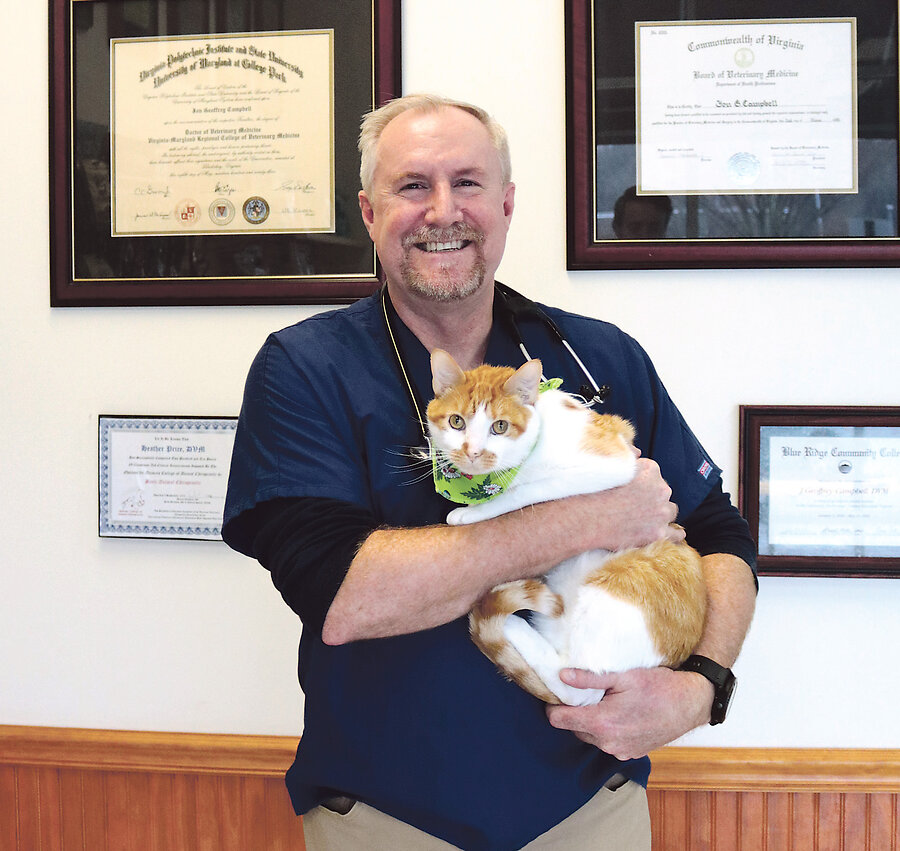DR. GEOFF CAMPBELL OF EDINBURGH ANIMAL HOSPITAL
New Year Pet Resolutions
by

Dr. Geoff Campbell
Since opening Edinburgh Animal Hospital in 2006, Dr. Geoff Campbell has won local pet owners' praise for being a great doctor who truly cares about the animals. For years, Dr. Campbell shared his love for animals and his expertise in maintaining their health through a column appearing in our pages.
One of his most memorable columns was New Year Pet Resolutions. "Every New Year, we make resolutions for ourselves," Dr. Campbell wrote. "I hope people will also make a few New Year resolutions for their pets."
With the health of our fuzzy, four-legged family members in mind, we again offer those resolutions, along with the wisdom and sound advice that Dr. Campbell offered in other columns.
Exercise and play with your pet daily.
"Your pet will love the attention, and both of you will maintain a healthy weight.
"Your pet will love the attention, and both of you will maintain a healthy weight.
Feed your pet good quality food-but not in excess.
"There are many good quality pet foods on store shelves. The goal is finding the right food that agrees with your pet-food that they like and that doesn't contribute to medical problems such as dry skin, diarrhea, and obesity. Premium brands such as Hill's, Iams, Eukanuba, Royal Canin, Nutro, and Purina all make high quality, balanced food for your dog or cat. These companies invest millions of dollars researching palatability, digestibility, and the quality of ingredients. They also invest millions in researching what ingredients and pictures on the bag will make you, the pet owner, purchase their food. First, understand that a diet that is appealing to you is not necessarily best for your pet. Second, just because it says ‘all-natural' or ‘organic' doesn't always mean it has better ingredients than a brand that doesn't say those things.
"There are many good quality pet foods on store shelves. The goal is finding the right food that agrees with your pet-food that they like and that doesn't contribute to medical problems such as dry skin, diarrhea, and obesity. Premium brands such as Hill's, Iams, Eukanuba, Royal Canin, Nutro, and Purina all make high quality, balanced food for your dog or cat. These companies invest millions of dollars researching palatability, digestibility, and the quality of ingredients. They also invest millions in researching what ingredients and pictures on the bag will make you, the pet owner, purchase their food. First, understand that a diet that is appealing to you is not necessarily best for your pet. Second, just because it says ‘all-natural' or ‘organic' doesn't always mean it has better ingredients than a brand that doesn't say those things.
"The wrong diet can contribute to obesity, diarrhea, poor hair coat, chronic vomiting, ear and skin infections, bladder stones, and seborrhea. An allergy to a single ingredient in the food is often the cause of these problems. The most allergenic ingredients include beef, lamb, glutens such as wheat and barley, and pork. Our pets suffer some of the same conditions that we do, such as inflammatory bowel disease, gastritis, alopecia, and seborrhea, all with food as a possible cause. Your veterinarian may suggest a food change or special hypoallergenic food trial to determine whether the diet you're feeding your pet is the problem.
Give your pets their monthly parasite control medicines such as heartworm prevention and flea and tick control.
"These preventive medications protect your pet and also protect you and your family from potentially life-threatening diseases," he points out. "Tick-borne illnesses are on the rise, and pets can bring them into the home, so keep giving these preventive medications year-round.
"These preventive medications protect your pet and also protect you and your family from potentially life-threatening diseases," he points out. "Tick-borne illnesses are on the rise, and pets can bring them into the home, so keep giving these preventive medications year-round.
"Ticks love shrubbery and low-lying brush, where they sit waiting for a host such as a deer, dog, or human to pass by. Blood-sucking parasites, ticks leap on a passing host and search for a site where they can attach and have a meal. They bite the skin of their host, using their saliva to cement their mouthparts into the host's skin so they can't fall off, and then begin engorging themselves on blood. During this process, they can infect their host with various diseases: Lyme disease, ehrlichiosis, anaplasmosis, Rocky Mountain spotted fever, and tick paralysis.
"A tick needs 48 hours of attachment to transmit Lyme disease to its host, so quick removal will help prevent disease transmission. Just as you would check yourself for ticks, you must check your pet's body when they have been outside. Using tick control products on our pets will help decrease the risk to us. Many products on the market are effective, such as Parastar Plus, Frontline Tritak, Vectra, Advantix (dogs only), Revolution, Seresto, Preventic, and Scalibor collars. Vaccinating your dog for Lyme disease is also important if they frequently pick up ticks. We can recommend a program to prevent ticks and vaccinate your dog if they are at risk.
"A tick needs 48 hours of attachment to transmit Lyme disease to its host,
so quick removal will help
prevent disease transmission.
Just as you would check yourself for ticks,
you must check your pet's body
when they have been outside.
Using tick control products on our pets
will help decrease the risk to us."
-Dr. Geoff Campbell
so quick removal will help
prevent disease transmission.
Just as you would check yourself for ticks,
you must check your pet's body
when they have been outside.
Using tick control products on our pets
will help decrease the risk to us."
-Dr. Geoff Campbell
Take care of your pet's teeth and have routine dental cleanings for your pet at your veterinarian
"Dental disease contributes to several life-threatening conditions such as kidney and heart disease. Pets need dental care too.
"Dental disease contributes to several life-threatening conditions such as kidney and heart disease. Pets need dental care too.
Perform routine wellness blood screenings in your older pets.
"Blood tests can uncover hidden diseases or give you a baseline to compare in the event of future illness.
Always have regular yearly Veterinary preventive health visits.
"Vaccinations aren't the only important part of preventative care. Your veterinarian's physical examination is the most important aspect of preventive care.
"Vaccinations aren't the only important part of preventative care. Your veterinarian's physical examination is the most important aspect of preventive care.
"Your family doctor recommends a yearly physical exam and requires it if you are on medication. Your dentist recommends at least a yearly teeth cleaning and dental exam. Your optometrist even recommends checking your vision yearly. This is even more important with your pets. Remember, your pet ages very fast due to their shorter life span. The average life span for a cat is 15 years, a small breed dog 12 to 15 years, and a large breed dog 10 to 12 years. So, each year of their life is equal to five to eight human years. Your pet experiences significant changes every year. Annual examinations can catch problems before they get serious.
"A thorough physical exam involves looking at every part of your pet from its nose to the tip of its tail. So, to keep your pet healthy and living a long, happy life, make a resolution to bring your pet to your veterinarian for a physical exam at least once a year."
"The average life span for a cat is 15 years,
a small breed dog 12 to 15 years,
and a large breed dog 10 to 12 years.
So, each year of their life
is equal to five to eight human years."
-Dr. Geoff Campbell
a small breed dog 12 to 15 years,
and a large breed dog 10 to 12 years.
So, each year of their life
is equal to five to eight human years."
-Dr. Geoff Campbell
"A thorough physical exam involves looking at every part of your pet from its nose to the tip of its tail. So, to keep your pet healthy and living a long, happy life, make a resolution to bring your pet to your veterinarian for a physical exam at least once a year."
Edinburgh Animal Hospital
141 Hillcrest Parkway
Chesapeake, VA 23322
757-432-0488
www.edinburghanimalhospital.com
CURRENT COLUMNS
Relationships 
When Your Security Blanket is in the Dryerby Dr. Bill AustinOn The Front Porch With You 
Memories of Homeby Rob LauerChildren First 
Dandelion Timeby Becky AdamsPublisher’s Point 
Time To Moveby Jean Loxley-Barnard

